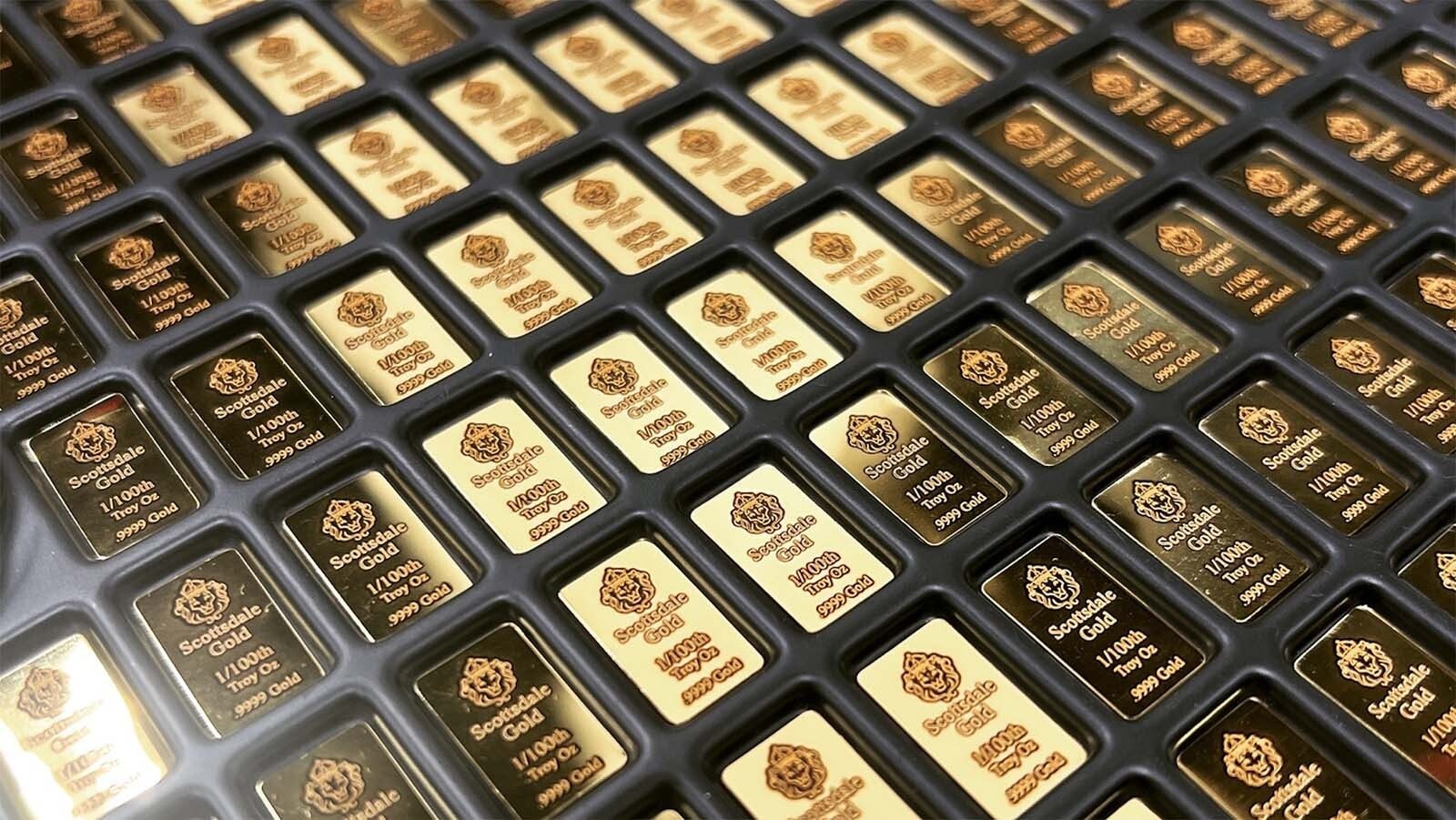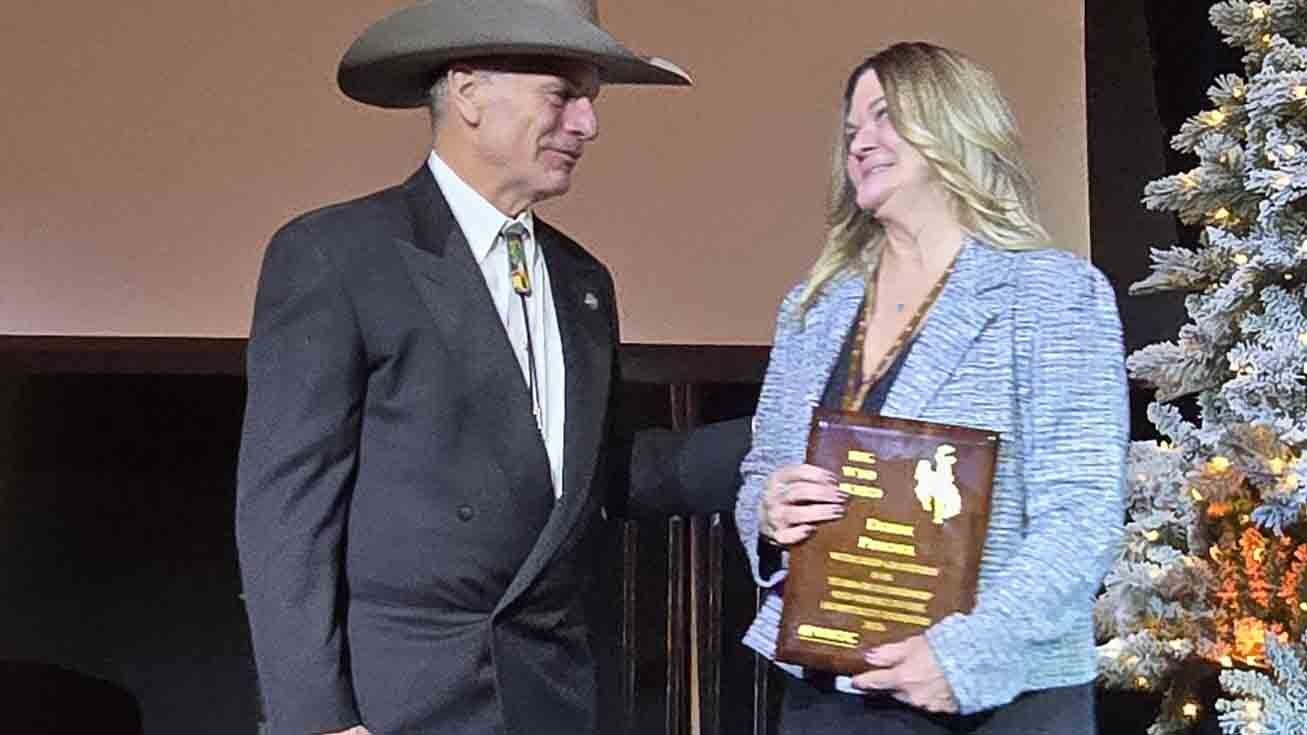When state Sen. Bob Ide, R-Casper, introduced the Wyoming Gold Act earlier this year — which requires the Wyoming state treasurer to buy and hold at least $10 million in physical gold — the price of gold was much lower.
It was hovering in the $2,600 to $2,700 per ounce range. Now gold is soaring high at $3,385 an ounce, and even reached $3,500 in April. Any gold bought then would already be worth about 33% more.
Such spikes in price have now made acquiring physical gold a little trickier than it was, Ide said.
But he also believes that’s helping demonstrate why holding physical gold is a valuable diversification of the state’s financial portfolio. It can help protect value and wealth from inflation and uncertainty.
“All things said, gold really doesn’t go up,” he said. “The dollar goes down. And gold is just a measure of what’s going on with the devaluation of our currency.”
The Wyoming Gold Act was the latest in a string of plays that have put the Cowboy State at the top of the 2025 Sound Money Index, published annually by the Sound Money Defense League and Money Metals Exchange.
Sound money is a term adopted by advocates of returning gold and silver to use as legal currency because they contend the precious metals hold their value over time.
The Index
The Sound Money Index looks at several factors for its ranking of all 50 states, including the overall environment and policies in each state when it comes to handling precious metals like gold and silver.
Extra points are also available for states that have gone beyond the conceptual and taken concrete steps toward sound money.
Those include holding state reserves in gold, as Wyoming is required to do by 2026 by the Wyoming Gold Act, or enforcing policies that reaffirm gold as legal tender.
Wyoming took the No. 1 spot from Utah in 2019, a year after passing the Wyoming Legal Tender Act, which removed sales taxes when buying or selling gold or silver bullion coins and bars. The bill was sponsored by the late Roy Edwards.
“We were one of the early states to accomplish that,” Ide said. “And Utah had essentially led the charge on that. But even Utah’s legislators said the Wyoming Legal Tender Act was the best one in the country.”
Ide had a unique vantage point on that particular bill.
“My wife actually got that bill drafted,” he said. “She’s state coordinator for Campaign for Liberty, and that is a movement among the states to pretty much reaffirm the U.S. Constitution, Article 1, Section 10, that makes gold and silver legal tender.”
Lots of states have followed Wyoming’s lead since, Ide added.
“Florida just passed making gold and silver legal tender,” Ide said. “And Governor DeSantis did a big, huge press conference and brought in all of the people who helped get it passed, and they proudly wore the badge of making gold and silver legal tender in the Free State of Florida, as they like to refer to it.”
Ide’s bill was just building on that progress, he said, and is something he believes will help get the right “plumbing” in place for the state to handle gold as legal tender.
Wyoming’s position as a leader in sound money has already been a game-changer, Ide added.
“I’ve heard the CEO of the Scottsdale Mint reference that a time or two as one of the reasons why they decided to come to Wyoming,” Ide said. “Because of our precious metals laws, and that Foreign Trade and Opportunity Zone. It’s an economic development attractor.”

Why Wyoming’s Sound Money Is Smart
Josh Phair told Cowboy State Daily he appreciates how Wyoming manages its money.
He confirmed that’s one of the big reasons he chose Casper for the Scottsdale Mint, which manufactures gold and silver coins for governments all over the world.
“Wyoming runs, it’s almost like its own sovereign wealth fund,” he said, referring to the state’s Mineral Trust Fund. “And if it was listed as a sovereign wealth fund, I think it’d be a top 20 in the world.”
Many states have been running deficits, Phair added, but Wyoming has taken the opposite tack.
“Where are those states going to get their money from?” Phair asked. “They’re going to ask for bailouts from somebody or taxes are going to go up.”
Phair has been impressed both with Wyoming’s sound money laws and its cryptocurrency legislation.
“To me, it doesn’t mean we’re going to be running around in gold chariots or anything,” he said. “To me, it just means steady.
“It means Wyoming isn’t going to change dramatically as it goes forward. It’s very strong as a state, and it’s been interesting to watch as Wyoming is looking at doing its own stable coin, rolling that out.”
Phair believes the stable coin has great potential to bring in profits to Wyoming, if it’s run well.
“Wyoming has its problems,” he said. “There are issues right now at certain county and city levels, and it’s tough.
“But the state is able to kind of help out on a lot of things, and hopefully while maybe the U.S. goes through some big storms here, Wyoming can stay stable.”
Not Everyone Is A Fan
Ide’s bill didn’t get Wyoming Gov. Mark Gordon’s signature. Instead, it got a letter objecting to several things in the bill.
“Gold is not an investment as much as it is a commodity or store of value,” Gordon wrote in his letter. “The only income to be derived from gold is to sell it for a greater price than it was purchased.
“Market timing speculation is not a consistently valuable investment strategy, as gold will trade for more or less depending on market conditions.”
Storing gold also requires significant expenses when it comes to security, logistics and warehousing, Gordon added, and is somewhat contrary to the state’s preferences to invest for “best available, risk-adjusted” returns.
Wyoming’s treasurer was already allowed to acquire gold as part of the state’s asset allocation, if and when it would be beneficial, Gordon added.
“To the extent the Legislature now intends to intervene in the consequential and significant process of positioning the State Loan and Investment Board’s investment process away from the objective of highest risk-adjusted return, to holding non-income producing assets, it represents an invasion of the responsibilities of the executive branch,” he wrote.
That could prove a detriment to the state portfolio’s performance, Gordon suggested, and is something to be avoided in the future.
Doesn’t Produce Investment Income
Wyoming’s Treasurer Curt Meier expressed similar issues as Gordon’s letter during testimony about the bill, but told Cowboy State Daily in an email he thinks it’s a sound idea overall.
“Our state’s investment in gold is just a drop in the bucket related to our overall strategy, as it represents less than 10th of a percent of our overall investments,” he said. "But it is a sound idea overall.
“Gold can help provide stability when inflation is high,” he continued. “And it’s easy to see how, since the price has continued to grow. With that said, the downside is there’s no way to take advantage of any increase in value, unless you sell your physical assets.”
Taking money away from the state’s investment portfolio by holding it in gold ultimately detracts from that fund’s purpose, Meier added.
“Wyoming’s General Fund depends on revenue from earnings on our investments — nearly one-third of the state’s budget is paid for through investment income,” he said. “Taking money away from our regular portfolio decreases the amount of money we will be able to provide annually.”
What Do Financial Experts Think About Sound Money?
Bryan Pedersen, a financial expert in Cheyenne, told Cowboy State Daily he felt characterizing the bill as a “sound” money policy is misleading.
“It’s incredible that we passed a bill that gives us an illiquid investment, one that requires assay value and an insurance policy,” he said, adding that he’s skeptical the state could use physical gold to pay debts it owed the federal government or a contractor.
“We’d have to move it to dollars, because a contractor won’t be paid in gold,” he said. “So, the idea of it being ‘sound’ money is interesting to say the least.”
Pedersen also objected to a requirement to buy gold on a particular timeline, saying that doesn’t allow the treasurer to pick the best timing and price for the asset.
While gold advocates say that gold by and large holds its value, Pedersen sees it as a commodity, and a volatile one at that.
“We’re now forced to hold something, even facing a possible downturn gold, but we’ve got to hold it either way, based on a legislative view that gold holds its price, regardless of what history may tell us,” Pedersen said. “And the insurance on that is through the roof. What do we do with it? Put it in one of those 150-year-old vaults?”
Storm Is Coming
Ide, however, sees it differently.
He’s noticed central banks stockpiling gold the past 16 or so years, and he believes upping the amount of gold reserves Wyoming holds is probably the next card the state should play when it comes to ensuring the soundness of its money.
“We’ve got a policy of $2 trillion deficit spending in Washington,” he said. “You know, we bring in about $5 trillion in tax revenue and we spend about $7 trillion. So, I think we need to own more precious metals.
“If you look at the charts of national debt, next to a graph of the price of gold, it’s the protector of deficit spending.”
The Congressional Budget Office estimates that in another 10 years, the United States will be another $24 trillion in debt, Ide added.
“That’s just more horsepower for gold to protect our wealth,” he said. “And I don’t see that changing. We’re not doing anything to lower our spending in this Big Beautiful Bill. They didn’t even implement any of the DOGE rescissions. It’s just status quo Biden spending.”
Another step Ide is interested in seeing next would be adding some physical gold to the state’s pension funds.
“I think there’s one other state, maybe Ohio, that has a pension that owns some physical gold, but really no other state has other than Utah,” he said. “I think Utah already has $60 million invested in physical precious metals. They’re a strong state financially, too, and they’re paying attention to what’s going on out there.”
Renée Jean can be reached at renee@cowboystatedaily.com.





